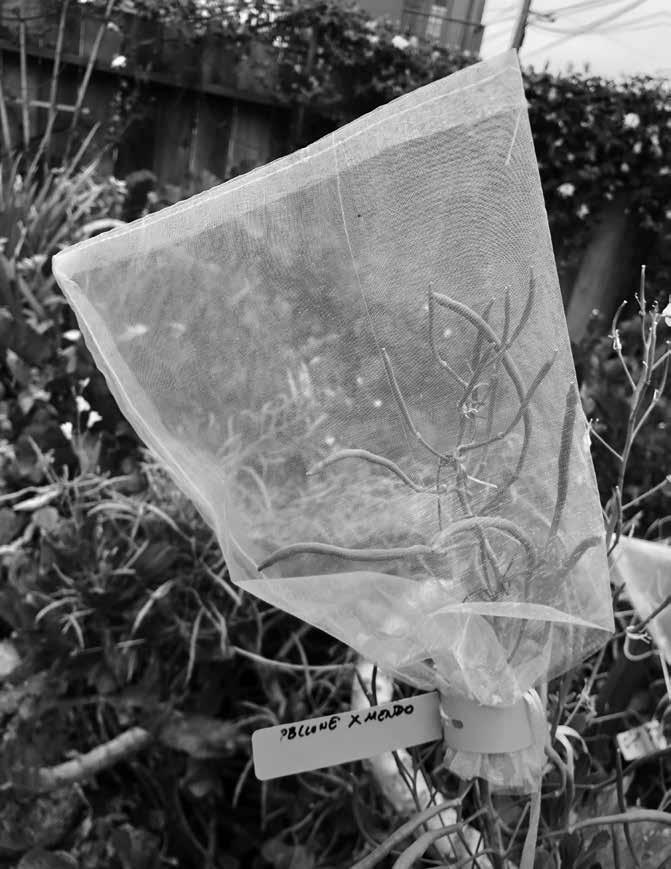
3 minute read
UNTO THYSELF BE TRUE
A Whole Life Approach to Resilience at Rock Steady Farm
In the United States, rural areas are not always welcoming of newcomers, especially if they are L G BTQIA or people of color. Defying deeply ingrained prejudices as well as the economic assumption that to pay the bills organic farms have to sell to high-end markets, Rock Steady Farm has been able to create a successful farm and welcoming community space with over half of its sales going to low-income households. By responding to the pandemic quickly and skillfully, the Rock Steady farmers have even been able to increase community support.
Advertisement
Late in 2015, Maggie Cheney and D Rooney established Rock Steady on twelve acres in Millerton, New York, a two-hour drive north of New York City. With a third partner, Angela DeFelice, who now operates as a financial advisor to the farm, they set out a complex social mission for an LGBTQIA-run cooperative, rooted in social justice. The partners proudly declare that they are “endlessly grateful to be who we are, and engaging in farming with both care for each other and the earth as best we can.” Creating a space where they themselves are comfortable and providing that sense of openness and acceptance to others is central to their effort.
The Rock Steady approach to farm creation is the opposite of John Wayne-style individual- ism. D and Maggie are methodical planners who take advantage of their own years of experience, the wisdom of farming elders, and counseling and advice available through their connections with the cooperative and social service communities. D and Maggie’s initial marketing plan was to develop a communitysupported agriculture (C SA ) program with share payments on a sliding scale so that lowerincome people could afford them, and to offset the lower prices of vegetables with sales of flowers that generate higher revenues. Rock Steady grew flowers for the first two years, but has put them on pause due to the rapid growth of the C SA propelled by the pandemic. A post on their Facebook page on April 7, 2021, declared, “C SA , we have actually sold out! Five hundred members strong, it’s our largest C SA to date! Woah!”
To access the capital to start up Rock Steady, the partners were able to take out a one hundred thousand dollar loan from The Working World, a “non-extractive” financial lender. The farm has also received funding and business advice from Seed Commons, the Cooperative Development Initiative, Community Food Funders, and the 2020 Food Movement Support Fund The farm also worked with a dozen other grantmaking organizations and private foundations in partnership with The Watershed Center— whose land they lease—acting as their fiscal sponsor.
To counter what Rock Steady calls “the intensity of capitalism, colonialism and the dehumanization of farmworkers,” the farm classifies everyone who works there as a farmer and potential member of their farmer-owned cooperative. In 2022, the farm team totals thirteen: five full coop owners, five others who share in the field work, and two who focus on administration and finances. A goal is to pay everyone a living wage and each year they get closer, sharing increased revenue among the whole crew. Everyone is on payroll, including Maggie and D, so they are eligible for Workers’ Compensation, have access to paid family leave, and, if the farm makes a profit, owners receive a portion. All farmers get a C SA share and paid vacation and paid sick leave. In 2022, the farm applied for Food Justice Certification as a way to acknowledge their commitment to farmworker justice.
As the child of a farmer, Maggie is sensitive to the many ways that growing healthy vegetables can damage physical and mental health. The farm is scaled to allow for diversified work each day. Workers are trained in food and farm safety and urged to learn new skills. The employee handbook stresses building “efficiency, speed and quality,” but limits the work day to eight hours and the budget only covers a forty-hour work week. An hour lunch break and two fifteen-minute rest breaks are mandatory. There are morning check-ins, three employee evaluations a season, and the whole crew makes time for peer review and facilitated support to navigate complex issues and conflicts, when necessary.
Each year, Rock Steady has increased the percentage of their food that goes to low-income people from an initial 40 to 57 percent of the C SA shares in 2020. Funding for the lowest payments and free shares does not come out of the farmers’ pockets—instead, the farm has a Food Access Fund for share subsidies and










